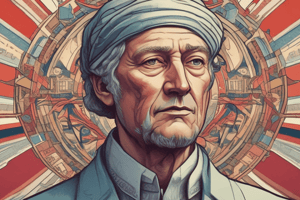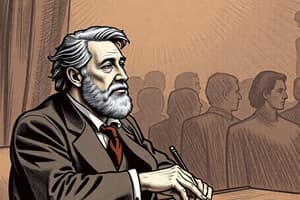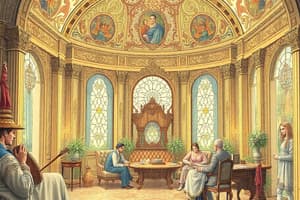Podcast
Questions and Answers
What is the primary goal of conservatism?
What is the primary goal of conservatism?
- To eliminate social hierarchy and authority
- To prioritize international cooperation over national interests
- To preserve traditional institutions and values (correct)
- To promote radical social change
Which of the following is a key characteristic of conservatives?
Which of the following is a key characteristic of conservatives?
- A preference for gradual and incremental reforms (correct)
- A belief in the importance of international cooperation
- A desire for rapid and radical social change
- A rejection of traditional values and institutions
Who is considered the father of modern conservatism?
Who is considered the father of modern conservatism?
- Karl Marx
- Edmund Burke (correct)
- John Locke
- Adam Smith
What is the conservative approach to change?
What is the conservative approach to change?
What is the primary role of authority in conservatism?
What is the primary role of authority in conservatism?
What is the conservative approach to economics?
What is the conservative approach to economics?
Flashcards are hidden until you start studying
Study Notes
Definition and Overview
- Conservatism is a political and social philosophy that promotes the preservation of traditional institutions, customs, and values.
- It emphasizes the importance of social hierarchy, authority, and morality in maintaining social order.
Core Principles
- Tradition: Conservatives believe in the importance of preserving traditional institutions, customs, and values.
- Authority: Conservatives believe in the importance of authority and social hierarchy in maintaining social order.
- Morality: Conservatives believe in the importance of morality and moral values in guiding individual and collective behavior.
- Gradual Change: Conservatives believe in gradual, incremental change rather than radical or revolutionary change.
Key Characteristics
- Caution: Conservatives tend to be cautious and skeptical of rapid change, preferring gradual and incremental reforms.
- Pragmatism: Conservatives prioritize practical solutions over ideological purity.
- Nationalism: Conservatives often prioritize national interests and sovereignty over international cooperation and global governance.
- Free Markets: Conservatives often support free market economics and limited government intervention in the economy.
Historical Development
- Edmund Burke: Considered the father of modern conservatism, Burke argued that social change should be gradual and respectful of tradition.
- 19th Century: Conservatism emerged as a distinct political movement in response to the French Revolution and the rise of liberalism.
- 20th Century: Conservatism evolved in response to the challenges of socialism, communism, and fascism.
Notable Conservative Thinkers and Politicians
- Edmund Burke
- Adam Smith
- Margaret Thatcher
- Ronald Reagan
- Russell Kirk
Studying That Suits You
Use AI to generate personalized quizzes and flashcards to suit your learning preferences.




